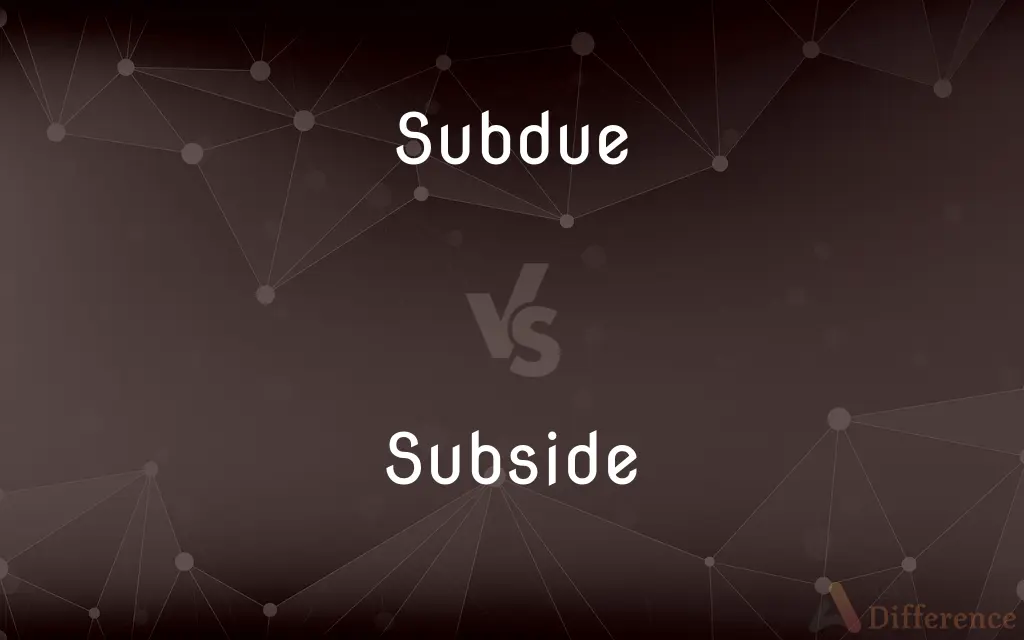Subdue vs. Subside — What's the Difference?
Edited by Tayyaba Rehman — By Urooj Arif — Updated on April 16, 2024
To subdue means to bring under control, often by force, as in quelling a rebellion, while to subside refers to a decrease in intensity or quantity, like the ebbing of a storm.

Difference Between Subdue and Subside
Table of Contents
ADVERTISEMENT
Key Differences
Subdue is typically used in contexts where control over another entity or situation is achieved through force or persuasion. Whereas subside is used when referring to things that diminish in intensity, volume, or extent over time without external force.
When one subdues something, such as emotions or an opponent, it implies an active effort or action to overcome and dominate. On the other hand, when something subsides, like pain or emotions, it suggests a natural or gradual decline to a lower state or cessation.
Subduing often involves a struggle or confrontation that requires energy or strategy to overpower the opposition. In contrast, subsiding is generally a passive process where no direct action is required to reduce the condition or state.
Examples of subdue include a team working to subdue a fire in a building or a teacher trying to subdue a noisy classroom. Meanwhile, subsiding could refer to the way storm conditions gradually lessen or how someone's anger cools off over time.
In terms of physical reactions, to subdue could involve restraining a person or animal, while to subside would describe the settling of sediment in a solution or the waning of symptoms after an intense episode.
ADVERTISEMENT
Comparison Chart
Meaning
To conquer or bring under control
To diminish or decrease naturally
Usage Context
Often involves force or authority
Involves natural or unaided reduction
Connotation
Aggressive or assertive
Passive or diminishing
Example Scenario
Subduing a riot
Pain subsiding after medication
Typical Subjects
Can be applied to people, animals, or situations
Applied to situations, feelings, or natural phenomena
Compare with Definitions
Subdue
To conquer or bring under control by force.
The police acted swiftly to subdue the unrest.
Subside
To become less intense, violent, or severe.
The storm finally began to subside around midnight.
Subdue
To make milder or less severe.
She took deep breaths to subdue her panic.
Subside
To sink to a low or lower level.
The floodwaters subsided after three days.
Subdue
To reduce the intensity or degree of something.
The medication helped to subdue her symptoms.
Subside
To diminish in phase or intensity.
His enthusiasm for the project gradually subsided.
Subdue
To overcome or bring down by physical strength or persuasion.
He managed to subdue his opponent in the debate.
Subside
To descend or sink.
The foundation of the house subsided due to poor construction.
Subdue
To hold back or suppress.
He subdued his urge to yell.
Subside
To settle down; abate.
Her laughter subsided as she noticed the serious expression on his face.
Subdue
To subjugate (a region or people, for example) by military force.
Subside
To become less intense, active, or severe; abate.
Subdue
To bring under control by physical force, persuasion, or other means; overcome
Subdued the wild horse.
Subdued the rebellion in the party ranks.
Subside
To become smaller or less prominent, as swelling.
Subdue
To make less intense or prominent; reduce or tone down
I was unable to subdue my excitement about the upcoming holiday.
Subside
To move or sink to a lower or normal level
The earth subsided as the aquifer drained away.
Subdue
To bring (land) under cultivation
Farmers subdued the arid lands of Australia.
Subside
To sink to the bottom, as a sediment.
Subdue
To overcome, quieten, or bring under control.
Subside
To sit down slowly; settle down
"She looked swiftly around, and once she saw her husband, subsided primly onto the edge of a chair" (Jane Stevenson).
Subdue
To bring (a country) under control by force.
Subside
(intransitive) To sink or fall to the bottom; to settle, as lees.
Subdue
To bring under; to conquer by force or the exertion of superior power, and bring into permanent subjection; to reduce under dominion; to vanquish.
I will subdue all thine enemies.
Subside
(intransitive) To fall downward; to become lower; to descend; to sink.
Subdue
To overpower so as to disable from further resistance; to crush.
Nothing could have subdued natureTo such a lowness, but his unkind daughters.
If aught . . . were worthy to subdueThe soul of man.
Subside
(intransitive) To fall into a state of calm; to be calm again; to settle down; to become tranquil; to abate.
The sea subsides.
The tumults of war will subside.
The fever has subsided.
Subdue
To destroy the force of; to overcome; as, medicines subdue a fever.
Subside
To cease talking.
Subdue
To render submissive; to bring under command; to reduce to mildness or obedience; to tame; as, to subdue a stubborn child; to subdue the temper or passions.
Subside
To sink or fall to the bottom; to settle, as lees.
Subdue
To overcome, as by persuasion or other mild means; as, to subdue opposition by argument or entreaties.
Subside
To tend downward; to become lower; to descend; to sink.
Subdue
To reduce to tenderness; to melt; to soften; as, to subdue ferocity by tears.
Subside
To fall into a state of quiet; to cease to rage; to be calmed; to settle down; to become tranquil; to abate; as, the sea subsides; the tumults of war will subside; the fever has subsided.
Subdue
To make mellow; to break, as land; also, to destroy, as weeds.
Subside
Wear off or die down;
The pain subsided
Subdue
To reduce the intensity or degree of; to tone down; to soften; as, to subdue the brilliancy of colors.
Subside
Sink to a lower level or form a depression;
The valleys subside
Subdue
Put down by force or intimidation;
The government quashes any attempt of an uprising
China keeps down her dissidents very efficiently
The rich landowners subjugated the peasants working the land
Subside
Sink down or precipitate;
The mud subsides when the waters become calm
Subdue
To put down by force or authority;
Suppress a nascent uprising
Stamp down on littering
Conquer one's desires
Subside
Descend into or as if into some soft substance or place;
He sank into bed
She subsided into the chair
Subdue
Hold within limits and control;
Subdue one's appetites
Mortify the flesh
Subdue
Get on top of; deal with successfully;
He overcame his shyness
Subdue
Make subordinate, dependent, or subservient;
Our wishes have to be subordinated to that of our ruler
Subdue
Correct by punishment or discipline
Common Curiosities
Is subduing always violent?
Subduing often involves force but isn't necessarily violent; it can involve calming or persuasion.
What is the difference between subduing a conflict and a conflict subsiding?
Subduing a conflict involves active efforts to control or end it, whereas a conflict subsiding means it diminishes on its own over time.
What does it mean to subdue someone?
To subdue someone means to bring them under control, often by using physical force or persuasion.
How does pain subside?
Pain subsides as it becomes less intense, often naturally or with the aid of medications.
What might you subdue in a professional setting?
In a professional setting, one might subdue a disruptive behavior or opposition in a meeting.
How does subsidence affect buildings?
Subsidence can cause buildings to sink or tilt, potentially leading to structural damage.
Can emotions subside?
Yes, emotions can subside, meaning they diminish or become less intense over time.
Can a storm be subdued?
A storm cannot be subdued in the sense of control; it can only subside, meaning its intensity decreases naturally.
Is it possible to subdue inflammation?
Yes, inflammation can be subdued using medications or treatments that reduce its severity.
How do symptoms subside with treatment?
Symptoms subside with treatment as they become less severe and the condition improves.
Share Your Discovery

Previous Comparison
Drag vs. Grab
Next Comparison
Humility vs. ModestyAuthor Spotlight
Written by
Urooj ArifUrooj is a skilled content writer at Ask Difference, known for her exceptional ability to simplify complex topics into engaging and informative content. With a passion for research and a flair for clear, concise writing, she consistently delivers articles that resonate with our diverse audience.
Edited by
Tayyaba RehmanTayyaba Rehman is a distinguished writer, currently serving as a primary contributor to askdifference.com. As a researcher in semantics and etymology, Tayyaba's passion for the complexity of languages and their distinctions has found a perfect home on the platform. Tayyaba delves into the intricacies of language, distinguishing between commonly confused words and phrases, thereby providing clarity for readers worldwide.
















































